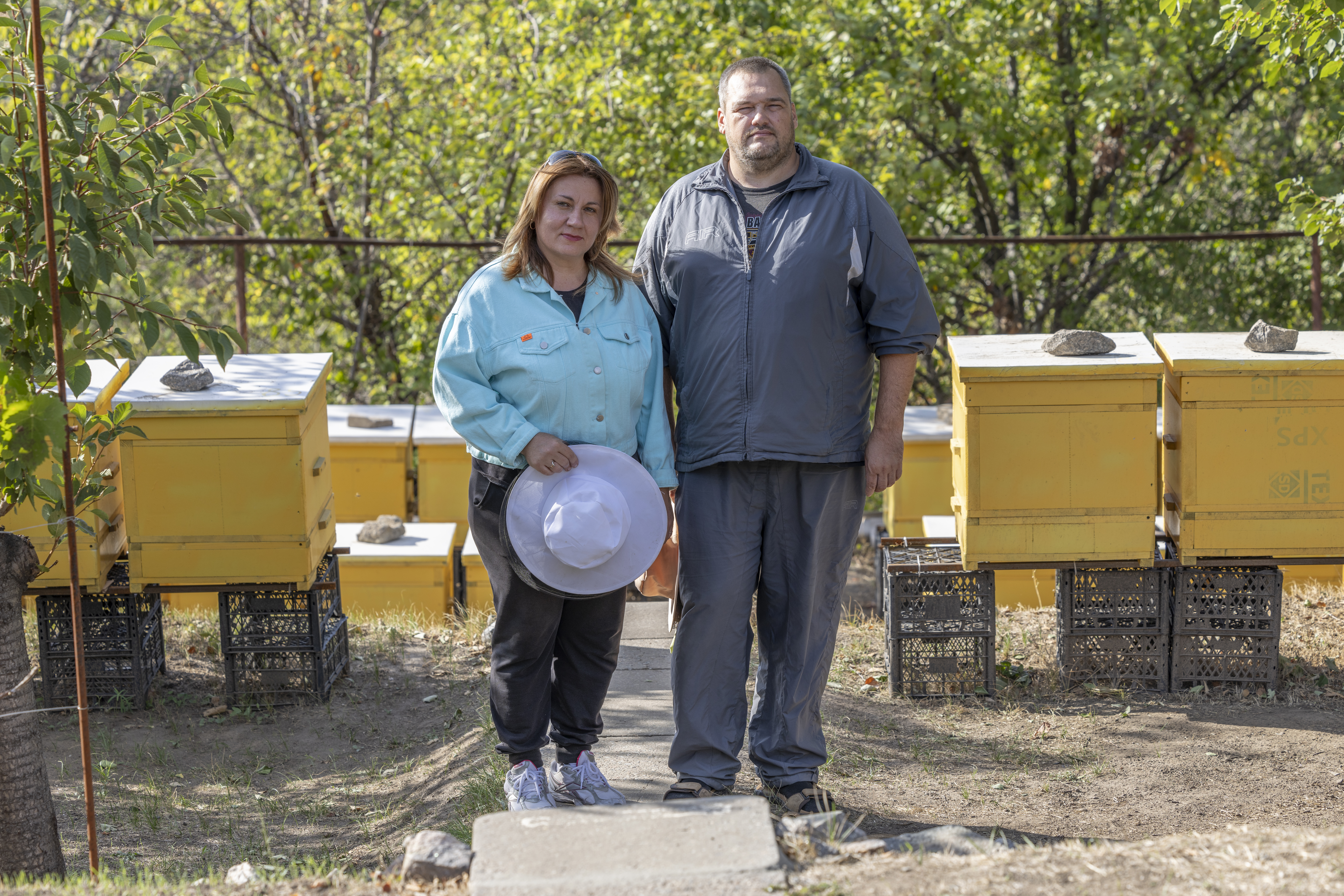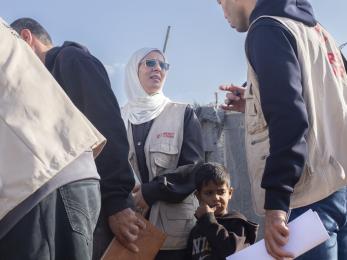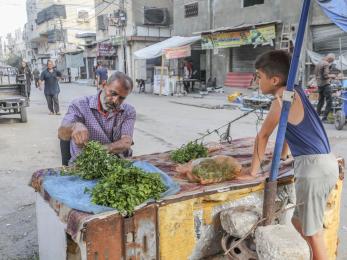Building climate resilience, one community at a time
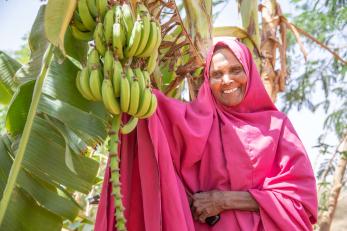
Climate change affects people’s lives and livelihoods all over the world. The World Health Organization estimates that 3.6 billion people already live in areas impacted by climate change. Low-income countries are disproportionately affected by the climate crisis even though they contribute the least amount of emissions. By collaborating with local organisations and communities, Mercy Corps offers resources and support to withstand and recover from climate shocks. Communities are becoming more resilient to climate change by increasing their farming yields, and growing their capacity to rebound quicker in the wake of natural disasters. Some shocks are preventable, and others require creative and innovative approaches to ensure that everyone can thrive in their own communities.
Through Mercy Corps’s Climate: Possible campaign, we are committed to addressing climate change in two ways: helping communities prepare for climate-related emergencies; and finding more sustainable, long-term solutions to support communities every day. From updating common farming practices to embracing the benefits of solar energy, Mercy Corps helps people thrive in response to the impacts of climate-related events. When communities can adjust to changing and unpredictable conditions, they can alleviate the challenges of climate change in their lives. Here are five ways Mercy Corps is supporting communities to build more climate resilience:
1. Delivering access to basic necessities during emergencies

Mercy Corps works with local organisations to deliver food, cash, water, and other necessities in the face of a climate emergency. Stocking up on supplies, building a volunteer network, and creating connections with local organisations means we can work together to distribute the right resources at the right time.
Islands in the Caribbean are among the most at risk to the effects of climate change. Devastating hurricanes and floods are becoming more frequent and intense. Mercy Corps’ teams in Puerto Rico transformed local community centres into Resilience Hubs equipped with solar energy, potable water storage, communication systems, emergency kits, health services, and more. With Takeda’s support, Mercy Corps is building more Resilience Hubs across the Caribbean.
In 2022, the Resilience Hubs delivered assistance immediately to people affected by Hurricane Fiona. The island received more than 30 inches of rain in a day, which collapsed bridges and left people without access to clean water or basic needs and services. The Resilience Hubs provided reliable access to critical resources in the aftermath. People in affected communities received immediate assistance so they could stay housed, fed, and safe with their families.
2. Utilising digital technologies to prepare for the future
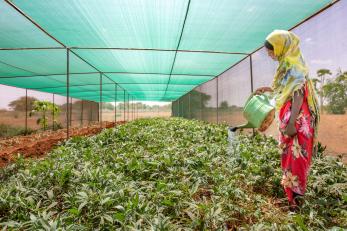
Many pastoralists and farmers in communities across the Horn of Africa are impacted by severe drought or flooding. In Kenya, farmers in Wajir County faced the region’s worst drought in over 40 years. They were unable to keep their livestock and crops alive during seasons without rain. With the first seasonal drought, many planned ahead by purchasing goats or using resources to plant more fruits and vegetables. But when the drought stretched into consecutive seasons, they weren’t able to give enough water for their animals to drink, or to help their crops grow. If the farmers had known how dire the circumstances could be, many would have chosen instead to use their incomes to purchase water and other essentials. Looking ahead, with the use of digital technology, pastoralists and farmers can better plan for the future.
Cisco and Mercy Corps are working together to bolster food security and ecosystem health in the region. By increasing the use of digital information services and tools among key decision-makers at the community, county, and national levels, people can make data-informed decisions to combat the impacts of climate change. For example, farmers can receive early warnings about El Nino rainfall predictions through technology developed by our teams. Community members can compare these numbers with their local knowledge of previous seasons’ rainfall to prepare for heavy rains, and move to higher ground when necessary.
Through the partnership with Cisco, Mercy Corps works to ensure that managing the rangeland is a community-led effort informed by the farmers’ expertise. One rangeland project is using community mapping to restore 500 acres of land ahead of the rainy season, and is expected to benefit over 1,000 households.
3. Providing sustainable methods to help restore farmland
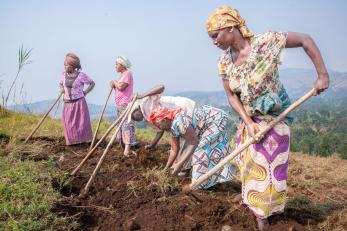
In the Democratic Republic of Congo (DRC), Mercy Corps piloted a program to improve farmland damaged by severe erosion and nutrient loss. Unpredictable natural disasters like flooding or drought harm farmlands and agriculture. Too much precipitation can wash away seedlings and too little can kill an entire season’s worth of crops.
Climate-smart systems build healthy ecosystems. Soil and water conservation are restorative farming practices that can increase yields and incomes. Local farmers use agricultural techniques that focus on the health of the soil to increase consistent yields and provide nutritious food for communities.
In South Kivu, DRC, farmers in Lulenga typically grow beans, maize, and root vegetables like manioc on rented farmland on the hillsides. But South Kivu’s hilly slopes are prone to erosion, which displaces topsoil nutrients and washes away most of their crops. With support from Mercy Corps, the farmers learned new skills like how to make healthier fertilizer for the soil and how to determine the best locations to dig channels to irrigate their crops. The alternative farming practices, including planting manioc in the dry season, boosted their harvests, and stabilised the top soil for planting crops year-round.
4. Harnessing the power of the sun

Mercy Corps helps increase access to climate-smart, sustainable, renewable energy around the world. In the Geita and Shinyanga regions of Tanzania, we installed solar-powered irrigation pumps to water crops on smallholder farms. Engineers led training sessions to teach farmers how to operate and manage the irrigation systems, alongside solar panels and pumps. The irrigation saves energy and increases yields as droughts and high winds from climate change damage crops and devastate people’s livelihoods and incomes.
Energy access is key to unlocking people’s potential. It powers businesses and fires up economic opportunities, paving the route to greater stability and resilience.
Cecilia Ragazzi, Mercy Corps Director of Energy Access
In 2021, only 24.5% of rural households in Tanzania had consistent access to electricity because the cost of linking to the grid was quite high. As the region works to improve access and availability, solar energy can run equipment and irrigate land to increase farmers’ yields. The higher yields improve local food security, and the training to operate and maintain solar panels and grids adds jobs to the region.
5. Investing in innovative companies to provide local solutions
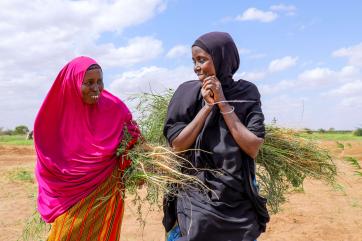

Mercy Corps’ impact investing team, Mercy Corps Ventures, funds and supports startups that are creating new models that accelerate progress toward climate resilience. Since 2016, Mercy Corps Ventures has been a leader in climate-related finance, with a strong track record of 47 investments and 13 pilot programs—reaching over 20.4 million people in 90 countries with products and services they need the most.
Mercy Corps Ventures has supported Stable Foods, a startup with a platform that offers drip irrigation solutions to smallholder farmers. Many irrigation providers focus on large-sized farms, instead of farmers in hard-to-reach areas, so smallholder farmers face competition from farms with more resources. Stable Foods uses its resources to give smallholder farmers access to the same irrigation solutions with water from a local reservoir. Each farmer can access water for a fraction of the cost.
Drip irrigation helps farmers dramatically multiply yields, withstand drought, and grow produce during dry periods. In addition to the irrigation system, Stable Foods offers products and services, including seeds, fertiliser, market access, and land leasing. By increasing efficiency and giving farmers more control, Stable Foods estimates that it can multiply farmer incomes by up to seven times what they’re making today.
Around the world, the communities we work with are coping through the immediate impacts of emergencies, embracing sustainable practices, and using technology and innovation to build climate resilience. Learn more about our partnerships and Mercy Corps’ commitment to advancing climate solutions through Climate: Possible. Together, we’re creating a climate-resilient future where everyone can flourish.

